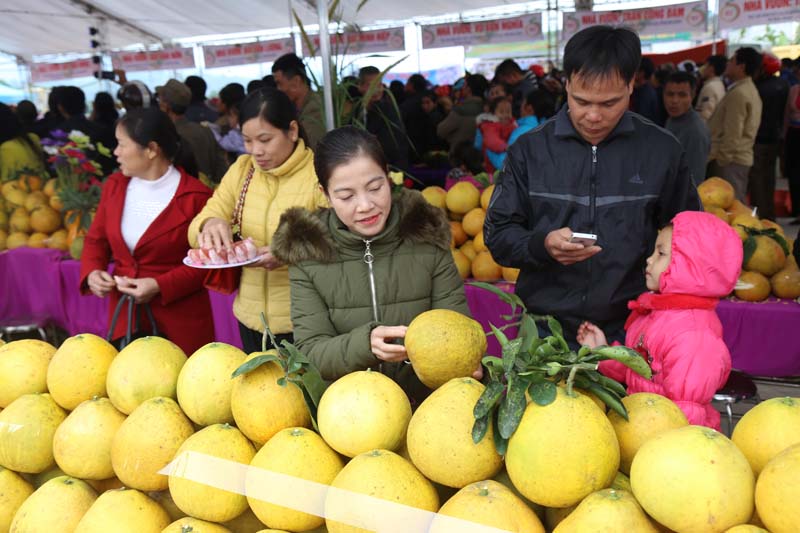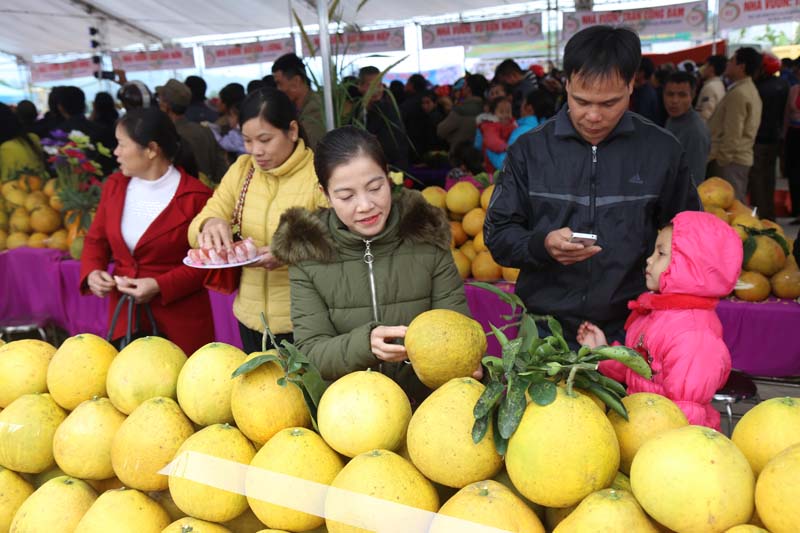
(HBO) - In Tan Lac – the land of red grapefruit, Mr Duong Tat Tinh, a resident in Tan Huong 1 hamlet, Thanh Hoi commune, is known as one of the first and most productive grapefruit farmers. In the past, he planted more than 120 red grapefruit trees across 5,000 square metres of land, earning at least 600 million VND each harvest. Now, his grapefruit plantation spans more than 5 hectares.

Tan Lac farmers proudly earn their living in the homeland via red grapefruit
business
Farmer Bui Van Don in Xom village, Nam Son commune, is also admired
for his will to get rich. Pioneering in changing the plant structure in the dry
and stony land, Don planted over 700 old tangerine trunks. His garden recorded
first bumper harvest in 2016, with 4 tonnes of fruit earning 80 million VND. The
2017 harvest was higher, earning about 300 million VND in revenue.
The good production – business emulation movement has developed extensively,
with the average annual participation of over 10,000 households. The number of
households meeting the criteria of productive and good quality at all levels
accounts for nearly 50 percent of total registered households. In 2017, the
whole district had 4,788 households, of which 17 households met the criteria at
national level, 471 at provincial level, 1,750 at district level, and 2,550 at
grassroots level.
Alongside launching the movement, the Tan Lac farmers union’s
chapters mobilised farmers to make donations to the "Day for the poor” fund, helping
312 members escape poverty in the period 2013 - 2018. Through support in terms
of workday, capital, business experience, materials, and seedlings, the chapters
provided over 1.8 billion VND and more than 5,000 seedlings for 255 poor
members and mobilised donations to build and hand over 11 charity houses./.
According to data from the Hoa Binh Provincial Party Committee, the industrial production index for the first six months of 2025 is estimated to have increased by 20% compared to the same period last year. This marks the highest year-on-year growth rate for this period since 2020.
In the first six months of 2025, Hoa Binh province’s export turnover was estimated at 1.145 billion USD, marking an 18.11% increase compared to the same period in 2024. Import turnover was estimated at $ 804 million, a 17.15% increase, which helped the province maintain a positive trade balance.
The lives of the ethnic minority farmers in Tan Lac district have gradually improved thanks to the new directions in agricultural production. This is a testament to the collective strength fostered through the professional associations and groups implemented by various levels of the district’s Farmers’ Union.
With the motto the "product quality comes first,” after nearly one year of establishment and operation, Muong village’s Clean Food Agricultural and Commercial Cooperative, located in Cau Hamlet, Hung Son Commune (Kim Boi district), has launched reputable, high-quality agricultural products to the market that are well-received by consumers. The products such as Muong village’s pork sausage, salt-cured chicken, and salt-cured pork hocks have gradually carved out a place in the market and they are on the path to obtaining the OCOP certification.
In the past, the phrase "bumper harvest, rock-bottom prices" was a familiar refrain for Vietnamese farmers engaged in fragmented, small-scale agriculture. But today, a new spirit is emerging across rural areas of Hoa Binh province - one of collaboration, organisation, and collective economic models that provide a stable foundation for production.
Maintaining growing area codes and packing facility codes in accordance with regulations is a mandatory requirement for agricultural products to be eligible for export. Recently, the Department of Agriculture and Environment of Hoa Binh province has intensified technical supervision of designated farming areas and packing facilities to safeguard the "green passport" that enables its products to access international markets.



